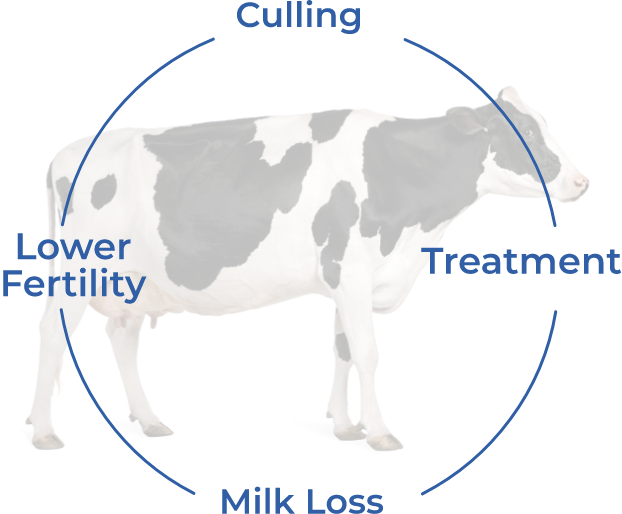H.D. Norman, L.M. Walton, and J.W. Dürr
Challenges during the transition period
Want more tips to optimize the reproductive performance of your herd?
Leave us your email and we’ll get back to you!
Want more tips to optimize the reproductive performance of your herd?
Leave us your email and we’ll get back to you!
In the early lactation period, energy requirements increase for milk production forcing the cow to utilize her own reserves.
Causing a domino effect resulting in poorer fertility
Ref.: Bradford et al., 2015
Negative energy balance increases the risk of developing metabolic disorders, such as clinical and subclinical ketosis.
Disease Plus body condition loss is more serious, resuling in 20% fewer cows pregnant (Riberio et al 2017)
Cows diagnosed with subclinical ketosis during the fresh period are 3 times more likely to develop.

Financial loss due to early lactation metabolic challenges

Causing a domino effect resulting in poorer fertility
Ensure transition period success by feeding protected B vitamins blends.
B complex vitamins are essential for overall metabolism, acting as enzymatic cofactors at the cellular level. Main benefits include increased dry matter intake, reduced energy lost that translates into less metabolic disorders.
Ref.: Morisson et “al.”, 2018 (ADSA and JDS)
Jefo Protected B vitamins will help fresh cow problems such as sub-clinical ketosis, mastitis and metritis:
✓ Reduce metritis & mastitis
✓ Reduce service per conception
✓ Improve pregnancy rate
✓ Reduce involuntary culling
Rumen protection for precise intestinal delivery
We expect to see our 1st lactation cows peaking at 95 lb and our 2nd lactation plus cows peaking around 130 lb and 50% of them to be confirmed pregnant after the first insemination by 70 days in milk.
Jefo’s Solutions for Dairy Cows have been a significant aid to helping us meet these expectations.
Jefo Solutions help alleviate the stressors.
Brian Fiscalini
Fiscalini Farms-Modesto, California
Research and field proven results!
Feeding protected B vitamins improves milk and
reproductive performance.
Ask a Jefo specialist to learn more about our solutions!
Help from our vet!
When do you have to worry about Metritis?
Here are a few tips from our animal specialist to help identify metritis
When do you have to worry about Metritis?
2. Less appetite
3. Foul-smelling fetid or abnormal discharge
2. Less appetite
3. Foul-smelling fetid or abnormal discharge
Metritis - Preventive measures
1. Appropriate supplementation of trace minerals and vitamins (including B vitamins).
2. Feeding a diet with appropriate levels of calcium and a negative Dietary-Cation Difference to prevent milk fever.
3. Minimization of negative energy balance around calving time by managing pen moves and preventing over-crowding and feeding appropriate transition rations.
4. A clean, dry maternity environment.
5. Well managed assistance when a calving difficulty occurs.













